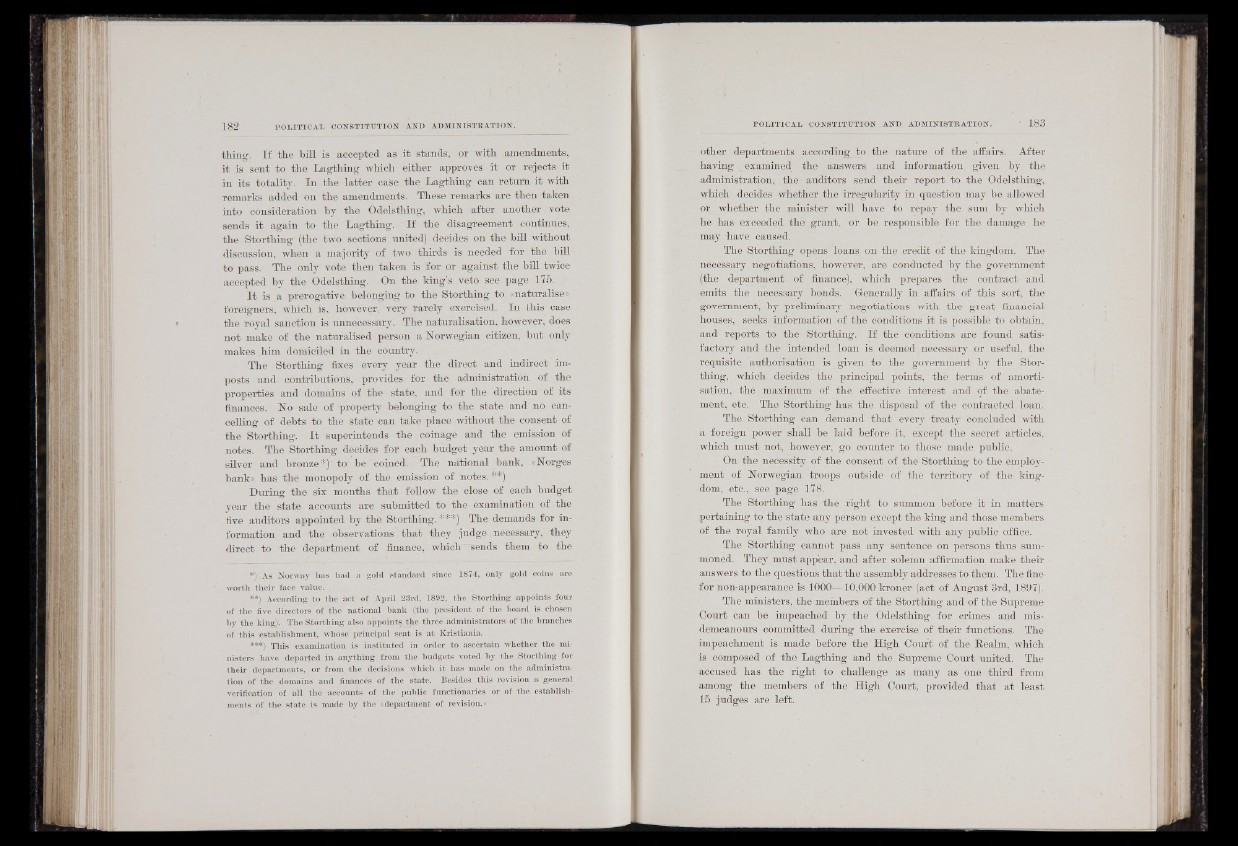
thing. If the bill is accepted as it stands, or with amendments,
it is sent to the Lagthing which either approves it or rejects it
in its totality. In the latter case the Lagthing can return it with
remarks added on the amendments. These remarks are then taken
into consideration by the Odelsthing, which after another vote
sends it again to the Lagthing. If the disagreement continues,
the Storthing (the two sections united) decides on the bill without
discussion, when á majority of two thirds is needed for the bill
to pass. The only vote then taken is for or against the bill twice
accepted by the Odelsthing. On the king’s veto see page 175. .
I t is a prerogative belonging to the Storthing to «naturalise»
foreigners, which is, however, very rarely exercised. In this case
the royal sanction is unnecessary. The naturalisation, however, does
not make of the naturalised person a Norwegian citizen, but only
makes .him domiciled in the country.
The Storthing fixes every year the direct and indirect imposts
and contributions, provides for the administration of the
properties and domains of the state, and for. the direction of its
finances. No sale of property belonging to the state and no cancelling
of debts to the state can take place without the consent of
the Storthing. I t superintends the coinage and the emission of
notes. The Storthing decides for each budget year the amount of
silver and bronze*)’ to be coined.- The national bank, «Norges
bank» has the monopoly of the emission of notes. **)
During the six months that follow the close of each budget
year the state accounts are submitted to the examination of the
five auditors appointed by the Storthing. ***) The demands for information
and the observations that they judge necessary, they
direct to the department of finance, which “ sends them to the
*) ,As Norway lias liad, a gold standard since 1874, only gold coins are
worth their face value.
**) According to the . act of April 23rd, 1892, the Storthing appoints four
of the five directors of the national hank (the president of the hoard is chosen
by the king). The Storthing also appointatjje three administrators of the branches
of this establishment, whose principal seat is at Kristiania.
***) This examination is instituted in order to ascertain whether the ministers
have departed in anything from the budgets voted by the Storthing for
their departments, or from the decisions which.it has made on the administrar
tion of the domains and finances of the state. Besides this revision a general
verification of all the accounts of the public functionaries or of the establishments
of the state is made by the «department of revision.»
other departments according to the nature of the affairs, After
having examined the answers and information given by the
administration, the auditors send their report to the Odelsthing,
which decides whether the irregularity in question may be allowed
or whether the minister will have to repay the Sum by which
he has exceeded the grant, or be responsible for the damage he
may have caused.
The Storthing opens loans on the credit of the kingdom. The
necessary negotiations, however, are conducted by the government
(the department of finance), which prepares the contract and
emits the necessary bonds. Generally in affairs of this sort, the
government, by preliminary negotiations with the great financial
houses, seeks information, of the conditions it is possible to obtain,
and reports to the Storthing. If the conditions are found satisfactory
and the intended loan is deemed necessary or useful, the
requisite authorisation is given to the government by the Storthing,
which decides the principal points, the terms of amortisation,
the maximum of the effective interest and of the abatement,
etc. The Storthing has the disposal of the contracted loan.
The Storthing can demand that every treaty concluded with
a foreign power shall be laid before, it, except the secret articles,
which must not, however, go counter to those made public.
On the necessity of the consent of the Storthing to the employment
of Norwegian troops outside of the territory of the kingdom,
etc.j see page 178.
The Storthing has the right to summon before it in matters
pertaining to the state any person except the king and those members
of the royal family who are not invested with any public office.
The Storthing cannot pass any sentence on persons thus summoned.
They must appear, and after solemn affirmation make their
answers to the questions that the assembly addresses to them. The fine-
for non-appearance is 1000—10,000 kroner (act of August 3rd, 1897).
The ministers, the members of the Storthing and of the Supreme
Court can be impeached by the Odelsthing for crimes and misdemeanours
committed during the exercise of their functions. The
impeachment is made before the High Court of the Realm, which
is composed of the Lagthing and the Supreme Court united. The
accused has the right to challenge as many as one third from
among the members of the High Court, provided that at least
15 judges are left.